РОЗМОВНИК ПРОВІДНИКА
УКРАЇНСЬКО-АНГЛІЙСЬКИЙ

Укладач: Іванець І. М. – викладач англійської мови
Зміст
Словник провідника
Найуживаніші залізничні терміни
і вирази, а також назви вагонного
обладнання………………………………………………………………………………….……….. 3
Розділ I
Форми звертання
Привітання. Знайомство ……………………………………………………………………….....10
Дні тижня…………………………………………………………………………………………....12
Місяці………………………………………………………………………………………………. 12
Числівники……………………………………………………………………………….….…..… 13
Розділ ІІ
Повсякденні слова і вислови………………………………………………………………...….. 14
Звертання………………………………………………………………………………………... ...14
Привітання……………………………………………………………………………………...….14
Подяка…………………………………………………………………………………………...…..15
Прохання…………………………………………………………………………………….…..….15
Пробачення…………………………………………………………………………………...…….17
Так. Ні………………………………………………………………………………………....….....17
Бажання…………………………………………………………………………………….……....18
На вокзалі ………………………………………………………………………………………… 18
У вагоні ……………………………………………………………………………………………..19
Розділ ІІІ
Діалоги
На залізничній станції ……….. ……………………………………………………………….…19
На вокзалі …………………………………………………………………………………………..20
Тексти
У потязі ……………………………………………………………………………………………...21
Транспорт …………………………………………………………………………………………...22
На залізниці ………………………………………………………………………………………...22
Подорож поїздом …………………………………………………………………………………...25
У поїзді: хто говорить…………………………………………………………………………...…26
Залізниця ……………………………………………………………………………………………27
Українські залізниці ………………………………………………………………………...…….28
Аудіювання…………………………………………………………………………………….....….29
Висновки …………………………………………………………………………………………….33
Список літератури …………………………………………………………………………………34
Словник провідника
Найуживаніші залізничні терміни і вирази,
а також назви вагонного обладнання
A Автоблокування Автозчеплення Амортизатор
Б Багаж Багажна квитанція Багажний роздатний Бак Безквитковий пасажир Безпека руху Буферна тарілка Буферний стакан, пружина Буфет
В Ваги Вагон - м’який - жорсткий - міжнародний - поштовий - багажний - ресторан - спальний - загальний - вантажний - класу першого - класу другого - класу третього - для курців - для некурців - плацкартний - комбінований Вагон зійшов з рейок Важіль перемикання Валюта Вантажна станція Вентилятор Вентиляція Відеоекран Відправлення поїзда Випускний клапан Відходити Відчіпляти Віза Візок Вікно Вийшов строк ревізії Використані запчастини Виделка Вимикач Внутрішнє обладнання Високовольтна магістраль Високовольтний кабель Вогнегасник Вокзал Вхід Вугілля
Г Гальмівна колодка Гальмо пневматичне Гальмівний рукав, кран, ручка крана Гальмівна тяга Гальмо ручне Гвинтова стяжка, крюк Генератор Генераторний ремінь Гілка Головка кабелю – штекер Гроші Гудок Гучномовець
Д Двомісне купе Дезінфекція Депо Диктор Диспетчер Домкрат Драбина складна
Е Експрес Електровоз Електромонтер Електроопалення Електропотяг Електророзетка
Ж Журнал
З Залізниця Залізнична колія Залізнична станція Зал очікування Замок Запізнення Засувка Затримка потяга Засоби зв’язку зворотний квиток Зупинка Зустрічний потяг
І Інвентар Інтернет
К Камера зберігання Карданний вал Касир Касир квитковий Квиток зворотний квиток квиток в одну сторону
Квиткова каса Кінцева зупинка Килим Кип’ятильник Клас (вагона) Ключ Книга скарг і пропозицій Ковдра Колісна пара Компостувати квиток Кондиціювання Кондиціонер Контролер-ревізор Конфіскація Коридор Кошик Котел, помпа, водяні баки, рама суфле, перехідний майданчик Котел опалення Крісло Кришки акумуляторні, буксові Кузов вагона Купе Л Лампочка електрична Лінія під напругою Ліхтарик Лопата
М Майстер вагонний Маршрут Матрац Машиніст Медпункт Міжнародне сполучення Мікрохвильова піч Міст залізничний Місце пасажира Мило Мито Митна декларація Митний догляд Митні документи Митний збір Митний інспектор Митниця Музика
Н Набирати воду Набирати вугілля Наволочка Надзвичайний випадок Накладна Настільна лампа Начальник поїзда Начальник вокзалу Непарний номер Нижнє місце Носилки санітарні Носій
О Обмін валюти Опалення Опис майна Останні новини Осьовий (генераторний) шків оштрафувати Оплата
П Парний номер Пасажир Паспорт Переїзд Пересадка Перонний квиток Перонна каса Під вагонний люк Підніжка Підсклянник Пісня Пилотяг Питна вода Платформа Плацкарта Повідець відпуску гальм Подушка Поїзд швидкий експрес вантажний приміський пасажирський дальнього сполучення нічий прямого сполучення поїзд Київ - Вроцлав товарно-пасажирський перший ранній InterСity
Покажчик назви станції Полиця Поламання Поручні Посадка Постіль Постільна білизна Посуд Поштовий поїзд Прапорець сигнальний Прибуття поїзда Причепити Провідник Прокладка гумова Прострочений квиток Простирадло Протиюзний прилад Пружина над буксова
Р Ревізор Редуктор на середній частині осі, від торця шийки осі Рейка Ресора Розвантажувати Розетка Розклад поїздів Роликова букса Рушник
С Світло Світлофор Семафор Серветка Серветка волога Серветка для взуття Сигнал Сигналізація Сигнальний прапорець Складач Скло Службове купе Сміттєвий бак Станція Стрілочник Струм увімкнено – вимкнено Стюард Стюардеса Т Тамбур Тариф Телевізор Тепловоз Термометр Топка Транзит Транзитне мито Транзитний пасажир Трансляція Транспорт Туалет Туннель Тупик Ф Фіранки Формувати Х Холодильник Ц
Цілометалевий вагон
Ч Чайник Черговий по станції Чистити Чохол Ш Швидка допомога Шлагбаум Шланг гумовий, головка шланга Шлях залізничний Шпала Штекерна коробка, кришка штекерної коробки Штора Штраф Шток Щ Щітка для взуття Щітка для одягу Щипці |
Automatic block system Automatic coupling Shock absorber
Luggage Luggage receipt Luggage distributor Luggage car Passenger traveling without a ticket Safe traffic Buffer head Buffer case, spring Buffet
Scales Carriage - soft-seated carriage - hard-seated carriage - wagon-lit - mail car - luggage car - dining car - sleeper - open carriage - goods car - first class - second class - third class - smokers (smoking car) - nonsmokers (non-smoking car) - а саr with reserved berths - combined The carriage suffered a derailment Switch lever of the brake regime Currency Goods station Ventilator Ventilation Video Screen Departure Brake release valve Leave Uncouple Visa Trolley Window The time of inspection elapsed The spate parts are used out Plug Switch Inner equipment High voltage mains High voltage cable Extinguisher Railway station Entrance Coal
Brake shoe Pneumatic brake Brake hose, valve (tap, cock), Brake rod Hand brake Screw tension, hook Generator Generator belt Siding Cable terminal Money Whistle Loudspeaker
Compartment for two Disinfection Depot Announcer Dispatcher Jack Folding ladder
Е Express Electric engine, Electric locomotive Electrician Electric heating Electric train Power socket
Magazine
Railway Track Railway station Waiting-room Lock The train is late Door-bolt Delay Means of communication Return ticket Stop Counter train
Items Internet
Luggage checking office Cardan shaft Cashier Ticket- clerk Ticket - return ticket (roundtrip) - one-way ticket Booking office Terminus Carpet Boiler Class (of carriage) Key Complaints and Suggestions Book Blanket Wheel set, wheels Punch a ticket Condition Air conditioning Ticket inspector Confiscation Corridor Basket Boiler, pump, water tanks, soufflet frame, gangway Heating boiler Armchair Accumulator cover, axle-box covers Carriage frame Compartment
Electric lamp Live line Lantern Spade
Carriage repairman Router Mattress Engine driver First-aid station International communication Microwave oven Railway bridge Passenger seat Soap Duty Customs declaration Customs inspection Customs papers Customs duty Customs inspector Customs Music
Take water Take coal Pillow-slip Accident Invoice Table lamp Chief of the train Station-master Odd number Lower berth Stretcher Porter
Exchange currency Heating Inventory list The latest news Axial generator belt To fine Payment
Even number Passenger Passport Crossing Change Platform ticket Platform ticket office Undercarriage manhole Foot-board Glass-holder Song Vacuum cleaner Drinking water Platform Reserved seat ticket Brake release valve handle Pillow Train fast express goods suburban, local passenger long – distance night through The Kyiv – Vrotslav mixed the first «Інтерсіті»
Station sign Berth Disrepair Handrails Boarding Bedding Bed linen Crockery Mail car Signal flag Arrival To couple Guard, Conductor Rubber washer Expired ticket Bed-sheet Counter slipping devise Axle-box spring
Inspector Reducer at the middle of the axle, from the axle journal but end Rail Spring To unload Socket Time table Roller axle-box Towel
Light Light signal Semaphore Napkin Wet napkin Napkin for boots Signal Signalling Signal flag Car-hooker Glass Guard’s compartment Litter-bin Station Switch man Current is on-off Steward Stewardess
Vestibule Tariff TV-set Diesel locomotive Thermometer Firebox Transit Transit duty Transit passenger Relay Transport Toilet (WC) Tunnel Siding
Curtains To marshal
Refrigerator
All-metal carriage
Tea-pot Station master on duty To clean Cover
First aid Barrier Rubber hose, hose head Track Tie Terminals box, terminal box cover
Curtain Fine Rod
Boot brush Clothes brush Tongs |
Привітання, знайомство Getting acquainted
Здрастуйте! Привіт! Доброго ранку! Доброго дня! Добрий вечір! Ласкаво просимо! Радий(а) з вами познайомитися Познайомтеся, будь ласка Дозвольте представити вам… пана… пані … панну … мого чоловіка мою дружину Я (ми) з… України Києва Львова Криму Я (ми) вперше у вашій країні (вашому місті) Ви говорите… мовою? англійською українською Я (не) розмовляю англійською мовою Ви мене розумієте? Я вас розумію. Я вас не розумію. Як це сказати англійською мовою? Як це перекласти? |
How do you do? Hello! Good morning! Good day! Good afternoon! Good evening! Welcome! Pleased to meet you! Please, introduce yourself I would like you to meet… Mister… Mrs … Miss … my husband my wife I am (we are) from… Ukraine Kiev Lviv the Crimea I am (we are) in your country (city) for the first time Can you speak…? English Ukrainian I (don’t) speak English Do you understand me? Yes, I do. I don’t understand you. How do you say that in English? How can that be translated?
|
Дати, час Dates. Time
Секунда Хвилина Година Доба Тиждень Місяць Рік Котра година? Зараз сьома година П’ять хвилин на десяту Опів на десяту За п’ять дев’ята За чверть дев’ята Рівно дев’ять Близько дванадцятої Хвилинку! Не запізнюйтеся! Поспішайте! Я не маю часу Сьогодні Вчора Завтра Післязавтра Позавчора Вранці Удень Увечері Вночі Опівдні Опівночі Сьогодні ввечері Вчора вранці Завтра вночі На цьому тижні Щодня Весною Влітку Восени Взимку Зараз же Давно Нещодавно Нині Через день Через кілька років Два дні тому У неділю
|
Second Minute Hour Day Week Month Year What is the time? It is seven o’clock Five minutes past nine Nine thirty (half past nine) Five minutes to nine Quarter to nine Nine o’clock exactly About twelve Just a minute, please! Don’t be late! Hurry up, please! I have no time Today Yesterday Tomorrow Day after tomorrow Day before yesterday In the morning During the day In the evening During in the night At noon At midnight This evening Yesterday morning Tomorrow night This week Every day In spring In summer In autumn In winter Right away Long ago Not so long ago Now In a day In a few years Two days ago On Sunday |
Дні тижня Days of the week
Понеділок Вівторок Середа Четвер П’ятниця Субота Неділя
|
Monday Tuesday Wednesday Thursday Friday Saturday Sunday
|
Місяці Months
Січень Лютий Березень Квітень Травень Червень Липень Серпень Вересень Жовтень Листопад Грудень |
January February March April May June July August September October November December |
Числівники Numerals
0 нуль 1 один 2 два 3 три 4 чотири 5 п’ять 6 шість 7 сім 8 вісім 9 дев’ять 10 десять 11 одинадцять 12 дванадцять 13 тринадцять 14 чотирнадцять 15 п’ятнадцять 16 шістнадцять 17 сімнадцять 18 вісімнадцять 19 дев’ятнадцять 20 двадцять 21 двадцять один 30 тридцять 40 сорок 50 п’ятдесят 60 шістдесят 70 сімдесят 80 вісімдесят 90 дев’яносто 100 сто 200 двісті 300 триста 400 чотириста 500 п’ятсот 600 шістсот 700 сімсот 800 вісімсот 900 дев’ятсот 1000 тисяча 10 000 десять тисяч 100 000 сто тисяч 1 000 000 мільйон Половина Третина Чверть Удвічі Утричі 1% Пара Дюжина
|
Zero One Two Three Four Five Six Seven Eight Nine Ten Eleven Twelve Thirteen Fourteen Fifteen Sixteen Seventeen Eighteen Nineteen Twenty Twenty-one Thirty Forty Fifty Sixty Seventy Eighty Ninety One hundred Two hundred Three hundred Four hundred Five hundred Six hundred Seven hundred Eight hundred Nine hundred One thousand Ten thousand One hundred thousand One million Half One third Quarter Twice Three times One percent A pair A dozen |
Повсякденні слова й вислови
Звертання Addressing people
Пасажири! Пане … Пані … Панна …
|
Passengers! Mr … Mrs … Miss … |
Привітання Greetings
Здрастуйте! Доброго ранку! Доброго дня! Добрий вечір! Як вам ведеться? Дякую, добре. Непогано. Так собі. Радий вас бачити. До побачення! До скорої зустрічі! На все добре! Щасливої дороги! Щасливої подорожі! Приємного дня! |
Hello! How do you do! Good morning! Good afternoon! Good evening! How are you? Fine, thank you Not bad. So-so. Glad to meet you. Good-bye! See you soon! Good luck! Bon voyage! Have a good journey! Have a nice day!
|
Подяка Expressing thanks
Дякую вам. Спасибі. Величезне вам спасибі. Я вам вельми вдячний. Дякую ви так багато зробили для нас(мене) Будь ласка. Дякую за увагу. Дякую за піклування. Дякую за гостинність. Дякую за допомогу. Дякую за пораду. Дякую за запрошення. Ви дуже ласкаві. Нема за що. Не варто подяки. |
Thank you very much. Thank you. Thank so much. I am very grateful to you. Thank you, I did so much for us (me).
You’re welcome. Thank you for your attention. Thank you for your care. Thank you for your hospitality. Thank you for help. Thank you for your advice. Thank you for the invitation. You are very kind. Not at all. Don’t mention it.
|
Прохання Requests
Чи не могли б ви мені допомогти? Можна? Дайте мені, будь ласка Дозвольте увійти? Зачекайте мене, будь ласка Палити можна? Дозвольте тут сісти? Проведіть мене, будь ласка. Дозвольте мені прибрати в купе Дозвольте мені тут підмести Дозвольте прибрати - газети, - журнали, - склянки. Дозвольте мені відкрити вікно Дозвольте пройти Відкрийте, будь ласка, - двері, - вікно. Будьте ласкаві, - передайте, - поясніть, - покажіть, - перекладіть. Будьте ласкаві, - дайте мені води Чи можу я побачити - начальника поїзда, - лікаря? Прошу вас говоріть голосніше, - повільніше. Я прошу вас зайти до мене до службового відділення. Я прошу вас зайти до нашого начальника потягу в … вагон. Я прошу вас заплатити за чай. Я прошу вас пройти зі мною на вокзал для вирішення цього питання. Роздягайтеся, будь ласка! Проходьте, будь ласка! Сідайте, будь ласка! Підійдіть, будь ласка! - сюди, - до нас, - до мене, - в четверте … - в службове купе. Пройдіть, будь ласка, до вагону. Приготуйте, будь ласка, ваші речі. Ми скоро прибудемо на вашу станцію. Складіть, будь ласка, речі. Ми скоро прибудемо на кінцеву станцію. Здайте, будь ласка … |
Could you help me, please? May I? Please give me… May I come in? Please wait for me May I smoke? May I sit here? Please show me the way to… May I tidy up the compartment? May I sweep here? May I take away - the newspapers, - the magazines, - the glasses? May I open the window? May I pass? Please open - the door - the window. Be so kind as - to pass, - to explain, - to show, - to translate. Be so kind as - to give me some water. Can I see - the chief of the train, - the doctor? Please speak a little louder, - slower. Come to see me in my service compartment. Please go and see the chief of the train in carriage ... Please, pay for the tea. Please come to the station with me to settle this matter.
Take off your coat, please! This way, please! Please sit down! Please wound you come - here, - to us, - to me, - to compartment … – to the service compartment. Pass into the carriage, please. Have your things ready, please. We shall soon arrive at your station. Pack your things, please. We shall arrive at the terminus. Please return…
|
Пробачення Regrets. Apologies
Дуже шкода. Шкодую. Я дуже шкодую, що так сталося. Пробачте. Вибачте! Вибачте, будь ласка. Вибачте, що я запізнився. Вибачте, що я вас турбую. Пробачте, що я примусив вас чекати. Це моя провина. Винен! Не сердьтеся. Я не хотів вас образити. Боюся, що я не зможу вам допомогти. Вибачте, я хотів дізнатися на якій станції ви виходите. Вибачте, я хотів дізнатися о котрій годині ви … Вибачте мою погану вимову. Вибачте, що запізнився. Вибачте, що затримався з чаєм. Вибачте, що завадив. |
Too bad. I am sorry. I am very much regret what happened. Pardon me, please. I beg your pardon! Excuse me, please Sorry, I am late. Please pardon the disturbance. Sorry I kept you waiting. That was my fault. I’m sorry! Please don’t be angry. I didn’t mean to offend you. I am afraid I won’t be able to help you.
Excuse me, I would like to know at what station you are leaving. Excuse me, I would like to know at what time you want your … Excuse my poor pronunciation. Sorry for being late. Excuse me for being late with the tea. Sorry for intruding. |
Так. Ні Yes. No
Добре, гаразд Чудово Так, звичайно Я з вами згоден Це справді так Чудова думка! Ви маєте рацію Гадаю, що так Цілком вірно Так, я можу Це мені подобається Ні, спасибі Ні, це не так На жаль. Ні, я не можу Я не згоден Нічого подібного! Навпаки! Ви помиляєтеся Я відмовляюся Погано, зле Не можна, неможливо |
Good Fine Yes, of course I agree with you Yes, that’s true Good idea! You are right I think so Quite correct Yes, I can I like it No, thank you No, it is not so No, I cannot. I am sorry I don’t agree Nothing of the kind! On the contrary! You are mistaken I don’t want to Bad It is impossible
|
Бажання Wishes
Провідник: Чого бажаєте? Пасажир: Я хочу - їсти, - пити, - спати, - відпочити, - пообідати, - поснідати, - повечеряти, - перекусити. Я хочу звернутися до вас з проханням. Я хочу просити вас принести - взуттєву щітку, - одежну щітку. Я хотів (ла) би отримати довідку. Я хочу переглянути путівник - розклад потягів. Я хочу прогулятися - по платформі - на вокзалі. Я хотів би зустрітися з - представником туристичної фірми, - консулом, - представником посольства. Я хотів би купити що-небудь на згадку. Я хотів би познайомитися з …. Ми хотіли б послухати українські пісні. Мені потрібно - купити - спитати - віддати.
|
Conductor: What do you want? Passenger: I want - to eat, - to drink, - to sleep, - to rest, - to have lunch, - to have breakfast, - to have supper, - to have a snake I have a request to make. I want to ask you to bring us - a boot brush, - a clothes brush. I would like to have some information. I want to look through a guide- book, - a train time-table I want to take a walk - on the platform, - to the station. I should like to see - a representative of the tourist firm, - the consul, - a representative of the embassy. I should like to buy a souvenir. I should like to meet…. We should like to hear Ukrainian songs. I want to buy to ask to give back..
|
На вокзалі
| At the Railway Station
|
Пасажир: Де знаходиться квиткова каса? Провідник: Ліворуч. Праворуч. (Ось там.) | Passenger: Where is the Booking office? Guard: There to the left.There to the right. (Over there.) |
Пасажир: Скажіть, будь ласка, де зала очікування? | Passenger: Tell me where the Waiting room is, please? |
Скажіть, будь ласка, де камера схову? | Tell me where the Luggage office is, please? |
У мене багато багажу. | I’ve got a lot of luggage. |
Де ресторан? | Where is the restaurant? |
Скажіть, будь ласка, де газетний кіоск? | Tell me where the newspapers stand is? please? |
Де довідкове бюро? | Where is the Inquiry office (Information office)? |
Де поштове відділення? | Where is the Post-office? |
Де можна подивитися розклад руху потягів? | Where is the time-table? |
Де знаходиться стоянка таксі? | Where is the taxi stop? |
Де зупинка автобуса, - метро? | Where is the bus stop - trolley-bus stop, - tram stop, - metro? |
Де знаходиться авіакаса? | Where is the air office? |
Скільки коштуватиме квиток у - спальному | How much does … - sleeper |
Квитковий касир: Ваш вагон – 12-ий | Ticket-clerk: Your carriage is number 12 |
Пасажир: Скільки діб дійсний квиток? | Passenger: How long is this the ticket valid for? |
Квитковий касир: Квиток дійсний … діб. | Ticket-clerk: It is valid for … days. |
Пасажир: Чи можна зробити зупинку в дорозі? | Passenger: Is it possible to make a stop ( interrupt the journey ) en route? |
Провідник: Так, можна. | Guard: Yes, it is possible. |
Я – провідник. | I am a guard (conductor). |
Я – начальник потяга. | I am the chief of the train. |
Я – квитковий касир. | I am a ticket-clerk. |
Я – носій. | I am a porter. |
Я – контролер. | I am a ticket-cоllector. |
Пасажир: Зараз уже пізно йти до газетного кіоску | Passenger: It is already too late to go to the newspapers stand. |
Ми прийшли занадто пізно. | We have come too late. |
Ми прийшли занадто рано. | Ми прийшли занадто рано. |
Давайте зробимо замовлення на квитки заздалегідь. | Let’s reserve (book) seats in advance.
|
Провідник: Підготуйте квитки, будь ласка. | Guard: Get your tickets ready, please. |
Провідник: Пред’явіть квитки, будь ласка. | Guard: Produce your tickets, please. |
Пасажир: Тут стільки колій: на якій колії стоїть наш поїзд? | Passenger: There are many tracks here: on which track is our train? |
Пасажир: Скажіть, де я можу купити перонний квиток? | Passenger: Tell me, where can I get a platform ticket? |
З якої колії відправляється потяг до … | On which track does the train for … leave? |
Від якої платформи відправляється потяг до … | From which track platform will the train for … leave? |
Як пройти на … платформу? | How does one get on to platform …? |
Яким потягом мені їхати?
| Which train am I to take? |
У вагоні
| In the Carriage
|
Пасажир: Де наше купе? | Passenger: Where is our compartment? |
Де наше місце? | Where are our berths (seats)? |
Місце № … | Is berth № … |
нижнє чи верхнє? | lower or upper? |
Провідник: Місце № … нижнє, верхнє. | Guard: Berth № …is lower or upper. |
Чи можу я зайняти нижнє місце замість верхнього? | May I occupy the lower instead of the upper berth? |
Чи можу я зайняти це вільне місце? | May I occupy this vacant berth? |
Провідник: Можна. | Guard: Yes, you may. |
Ні, не можна. | No, you may not. |
Пасажир: Це вагон для курців? | Passenger: Is this a smoking carriage? |
Провідник: Так, це вагон для курців. | Guard: Yes, this is a smoking carriage. |
Пасажир: Це вагон для некурців? | Passenger: Is this a non - smoking carriage? |
Провідник: Так, це вагон для некурців. | Guard: Yes, this is a non - smoking carriage. |
Покладіть, будь ласка, речі на полицю. | Put my things on the rack, please. |
Пасажир: Скільки діб наш потяг йде до …? | Passenger: How many days does our train take to get to … |
Провідник: Наш потяг йде до … діб. | Guard: Our train gets to … on the …day. |
Пасажир: Скільки годин наш потяг йде до …? | Passenger: How many hours does our train take to get to … |
Пасажир: Коли наш поїзд прибуває до …? | Passenger: When does our train arrive in …? |
Провідник: Наш поїзд прибуває до … о … годині … числа. | Guard: Our train arrives in … at … o’clock on the …day. |
Чи далеко Ви їдете? | Where are you going? |
Пасажир: Ми їдемо до … | Guard: We are going to … |
Пасажир: Опустіть, підніміть, будь ласка, полицю. | Passenger: Lower, raise the bunk, please. |
Провідник: Хвилинку, будь ласка. | Guard: Just a minute. |
Провідник: Здайте, будь ласка, Ваші квитки. | Guard: Hand your tickets over, please. |
Пасажир: Чи можна мені перейти до вагону № …? | Passenger: May I change to carriage № …? |
Провідник: Це питання вирішує начальник поїзда. Начальник поїзда знаходиться у вагоні № … | Guard: You must ask the chief of the train. He is in the carriage № … |
Пасажир: Через які великі станції пройде наш потяг? | Passenger: Through what big stations will the train pass? |
Провідник: Потяг пройде через … | Guard: The train will pass through … |
Пасажир: Скільки хвилин поїзд стоїть у …? | Passenger: How many minutes does the train stop at …? |
Мені там потрібно зробити пересадку. | I have to change trains there. |
Провідник: Там потяг стоїть … хвилин. | Guard: The train stops for ... minutes. |
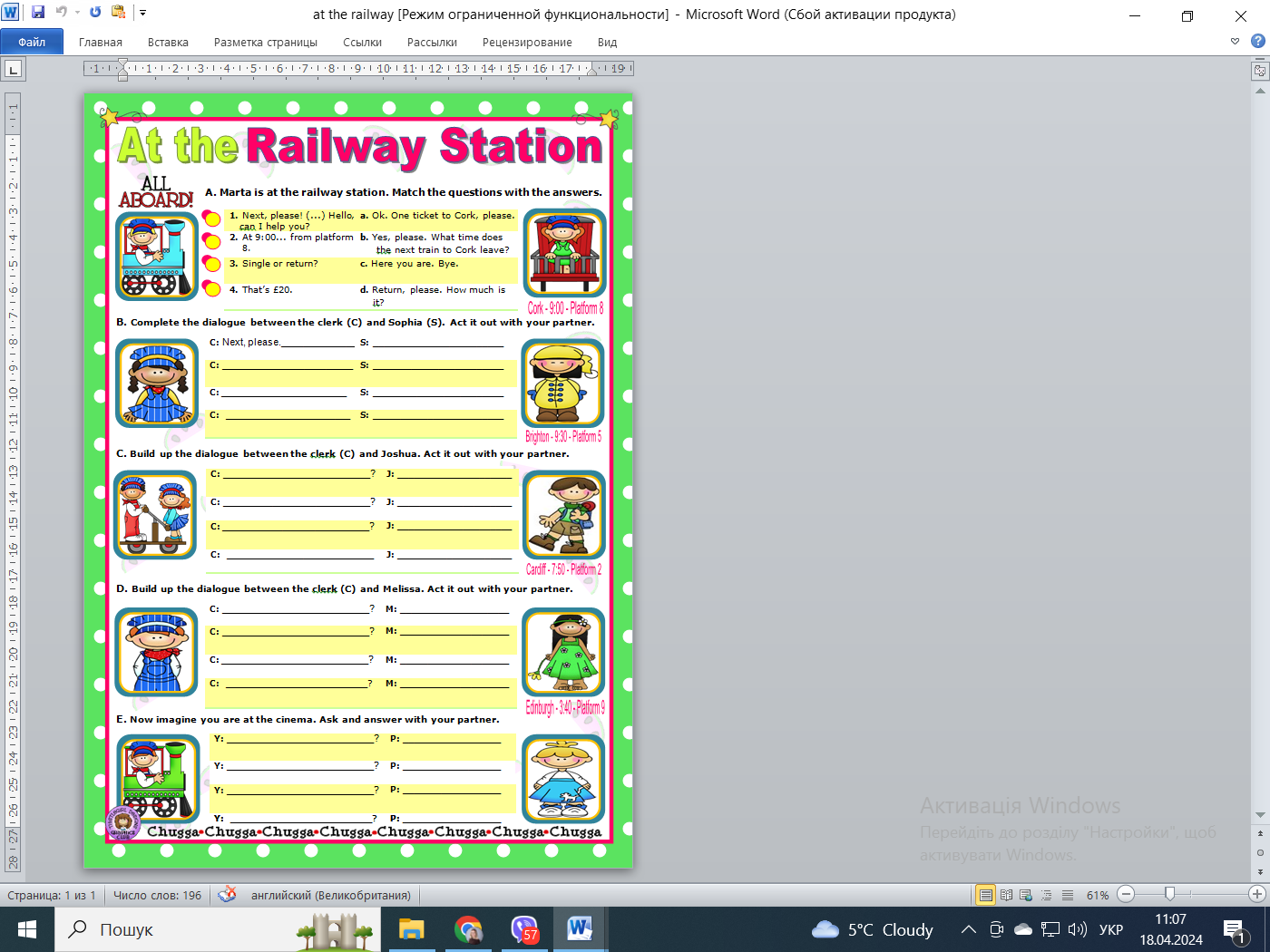
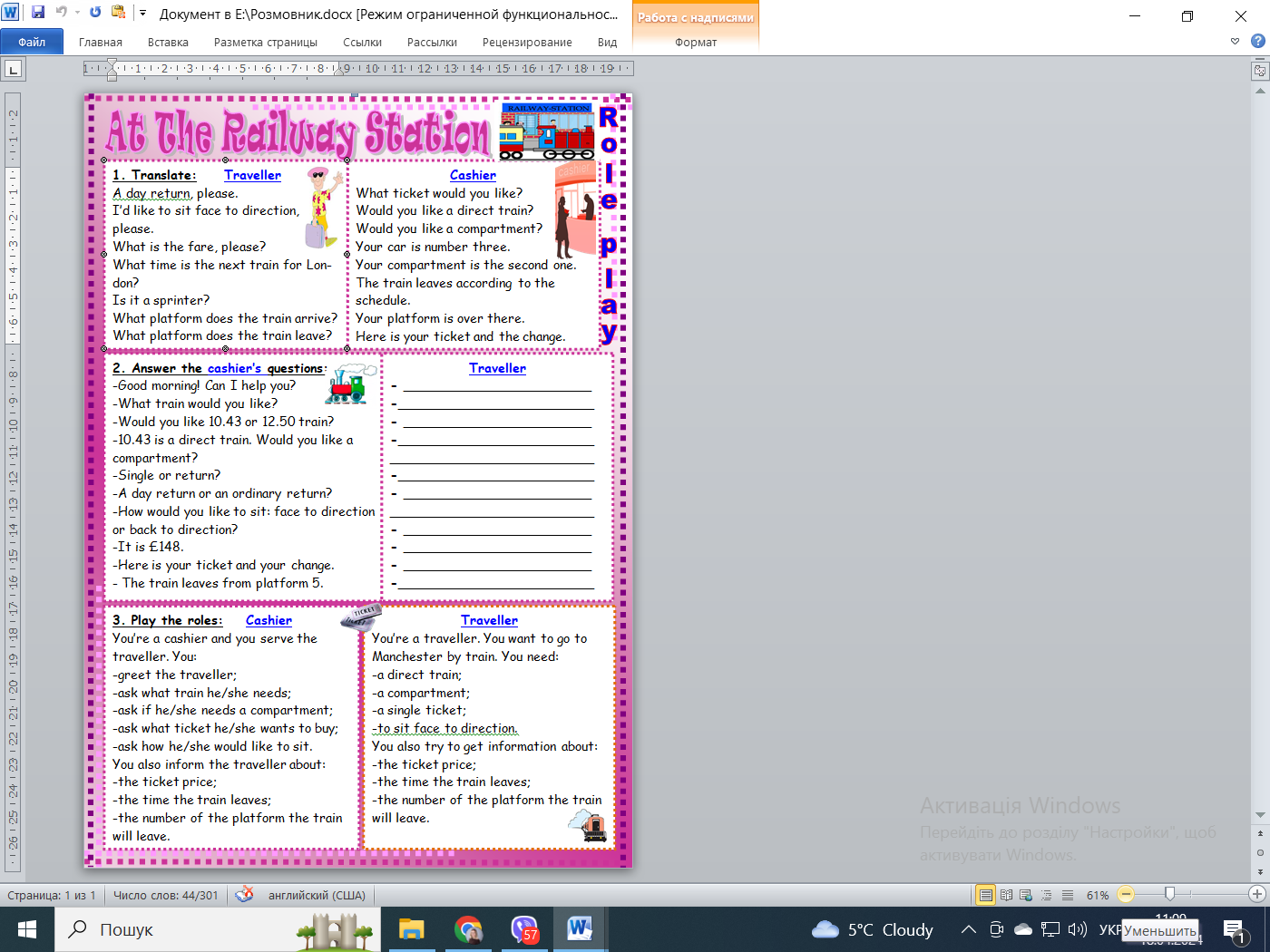
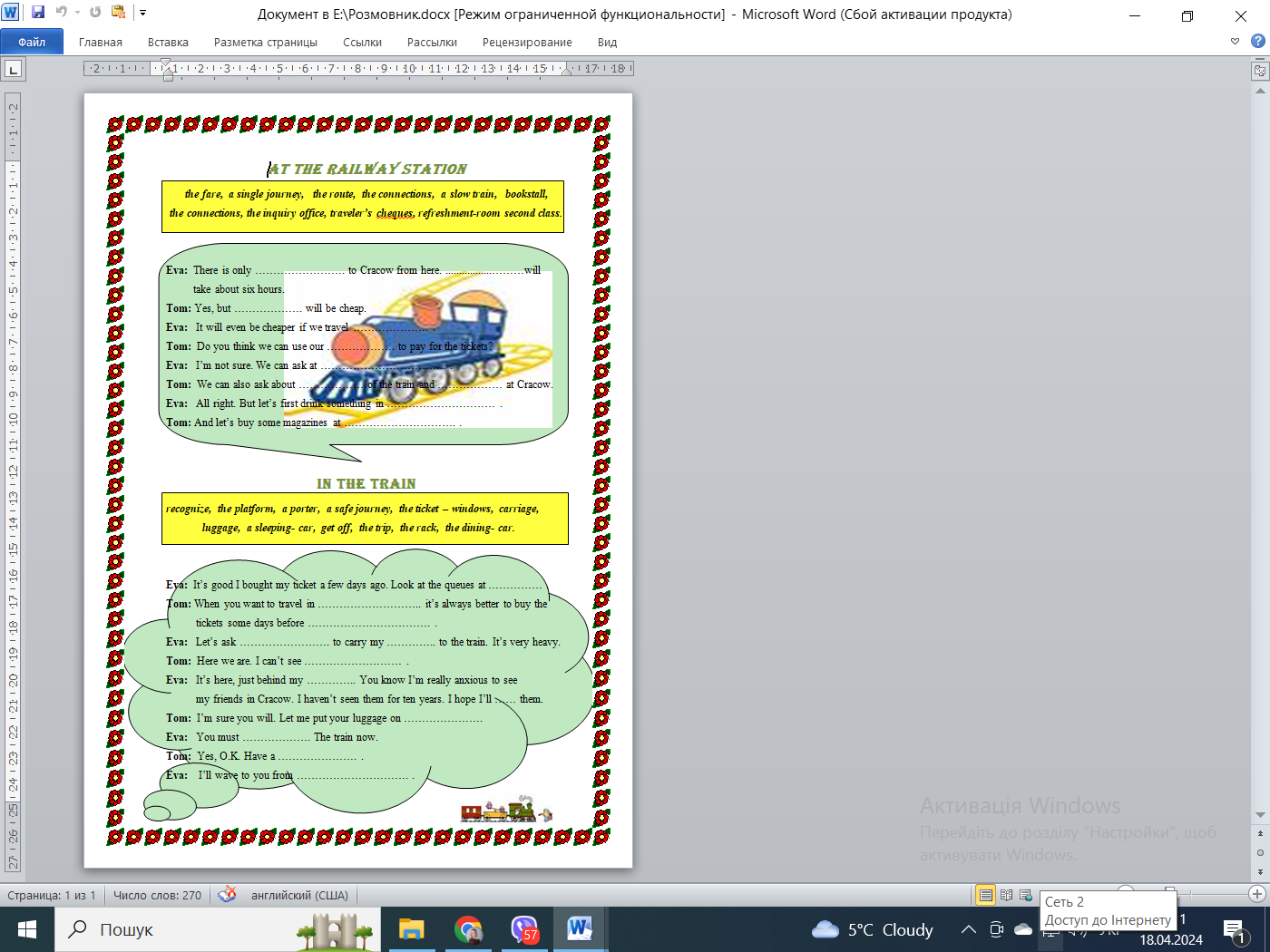
Transport

What Do You Know About Trains?
There are different kinds of trains: passenger trains, mail trains and goods trains. Mail trains carry mail or post: letters, parcels, newspapers and magazines. Goods trains carry goods. Passenger trains carry passengers. Mail trains and passenger trains carry people. Mail trains and passenger trains are usually combined: they have carriages for passengers and a special carriage for mail.
Passenger trains can be slow or fast. A slow train stops at every station. Fast trains have few stops: they stop only at large stations. So we can call these trains express stopping trains and non-stopping trains.
There are local trains and long-distance trains. Local trains connect points situated not far away from each other. By a long-distance train you can travel for thousand kilometers.
When you are traveling a long distance, it’s convenient to go by an overnight train with sleeping accommodation. Trains which run by day are called coaches. You can’t sleep in them as they have only sitting accommodation.
Tasks: 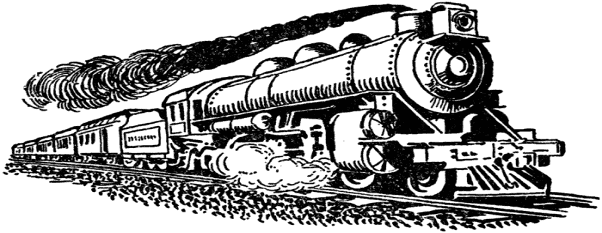
Fill in the gaps.
A: There are different ________ of trains, are not they?
B: Well, there are _______, _______ and _______ trains.
A: Mail trains are for _________. Passenger trains carry _________. And ________ carry _________.
B: That’s right.
A: What are ________ trains?
B: Slow trains move slowly. They stop at all ________.
A: I see. And what are fast trains?
B: ________ trains pass many _________ without stopping. They stop only at large stations.
A: Thank you.
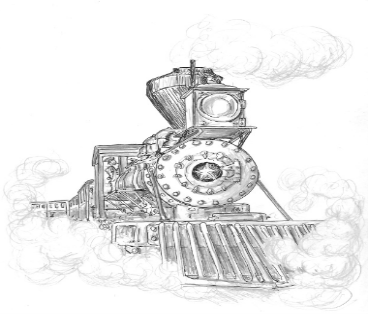
| 2. Make up the given sentences in correct order. 1) Fast trains have few stops. 2) Passengers trains can be slow or fast. 3) They stop at every large station. 4) A slow train stops at every station.
|
3. Make up the plan to the text.
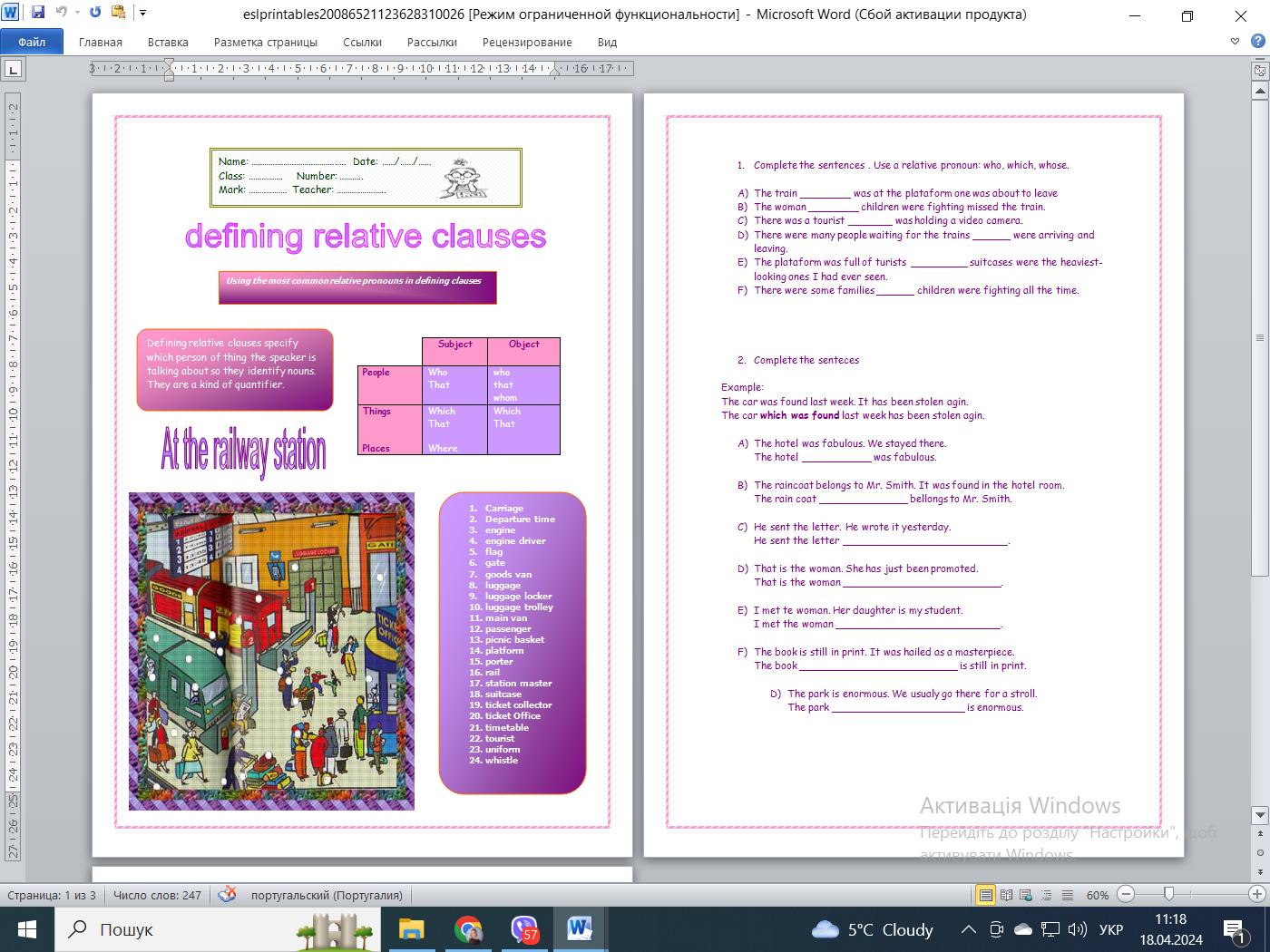

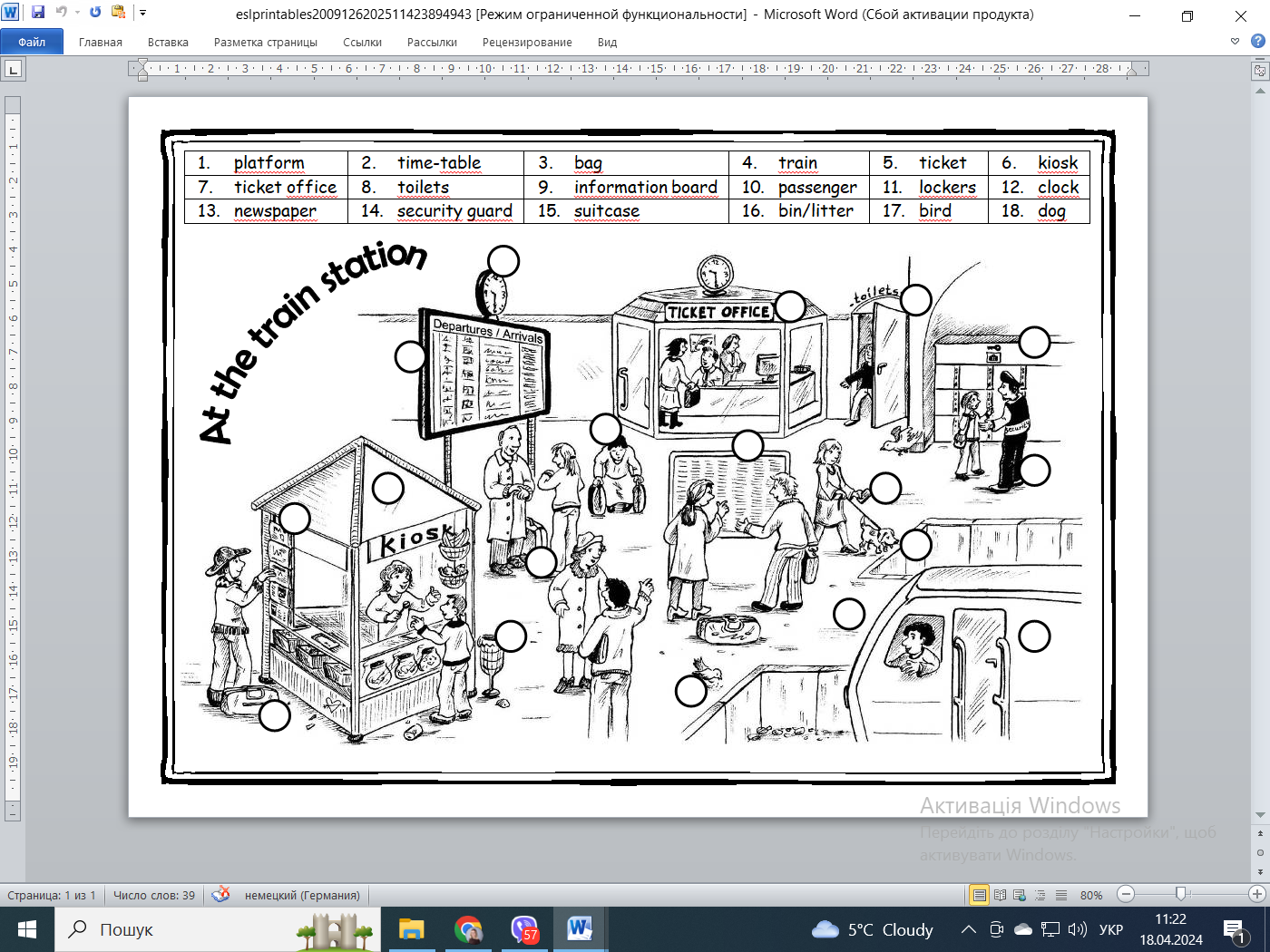
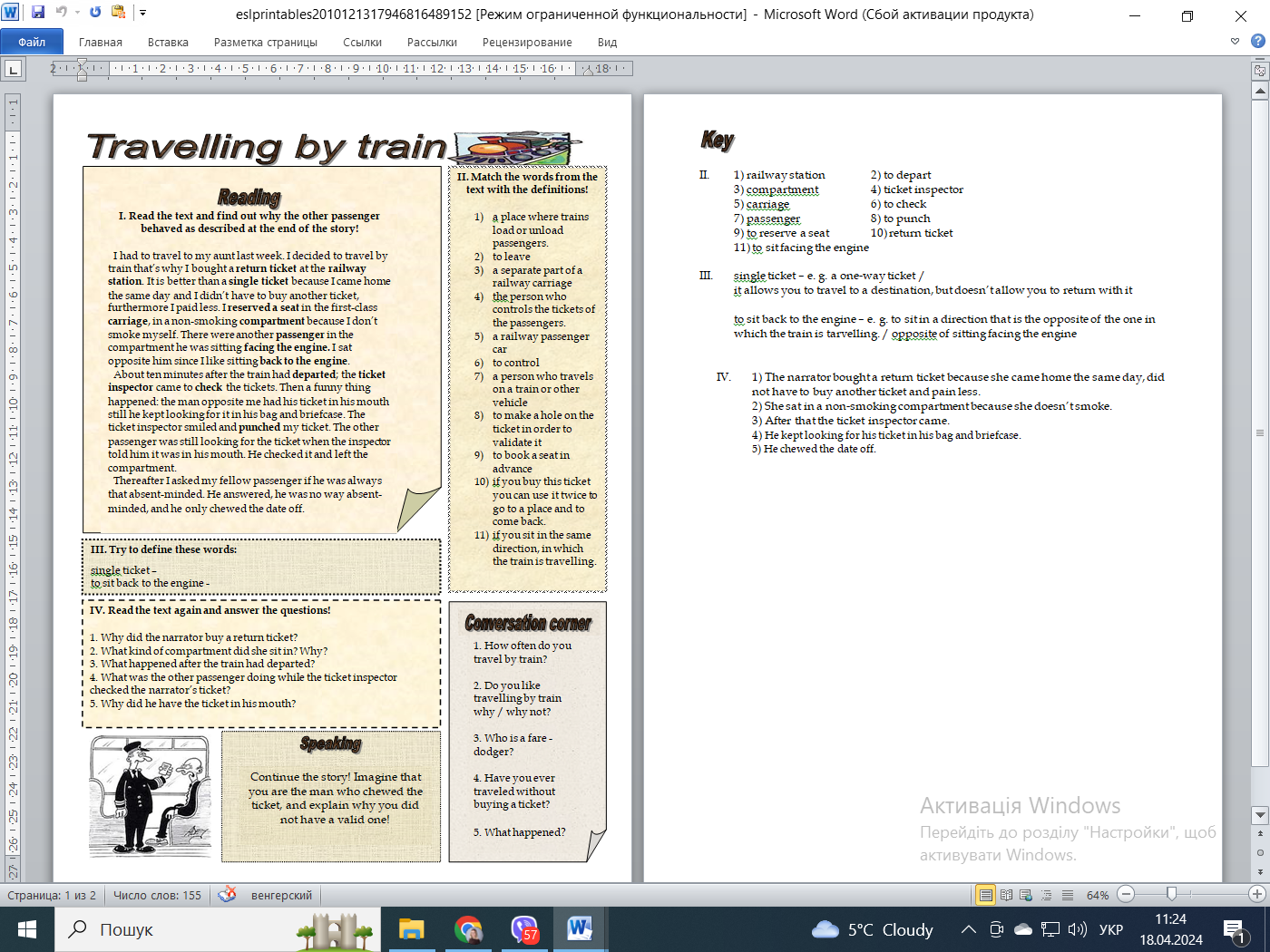
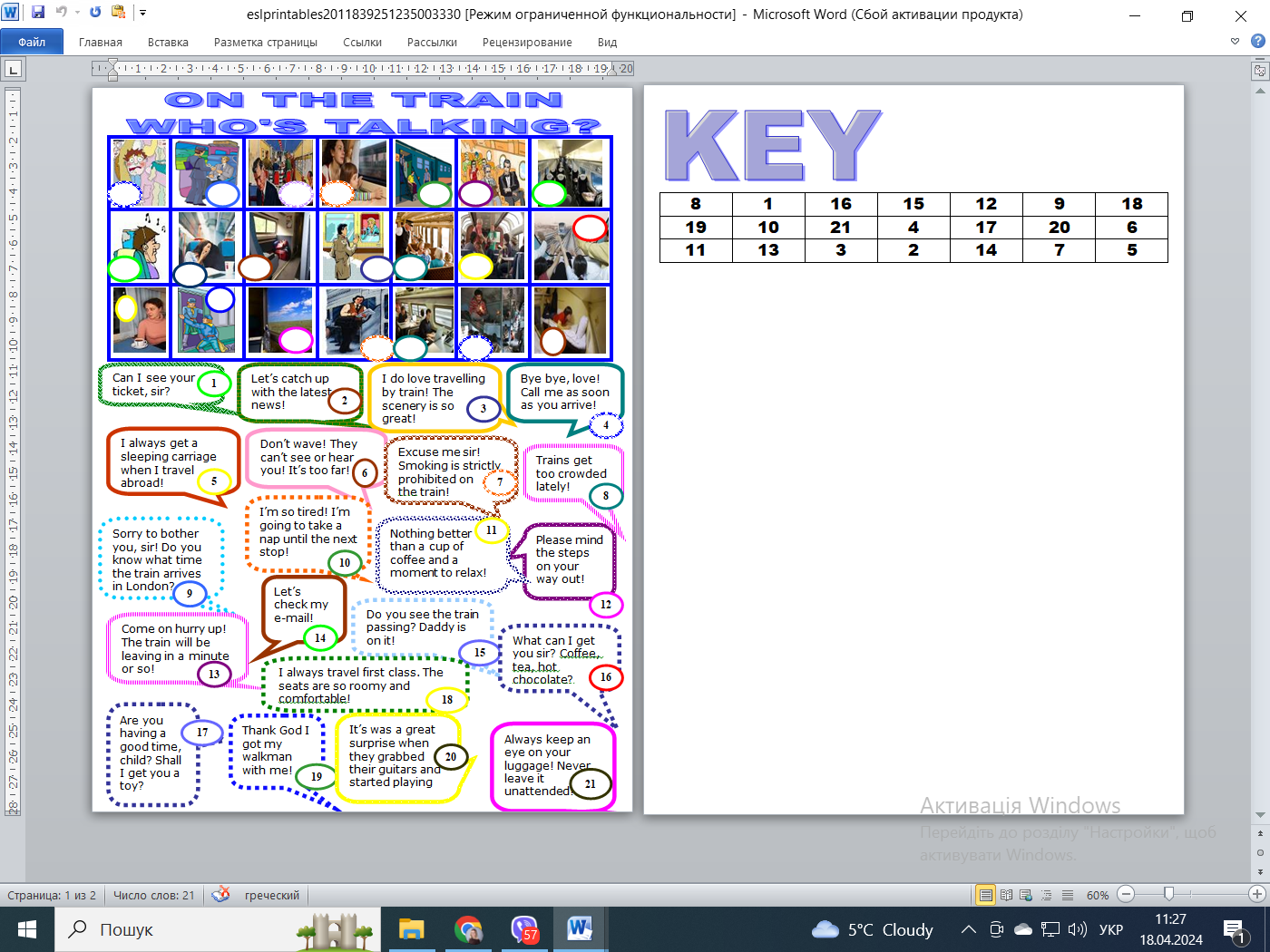
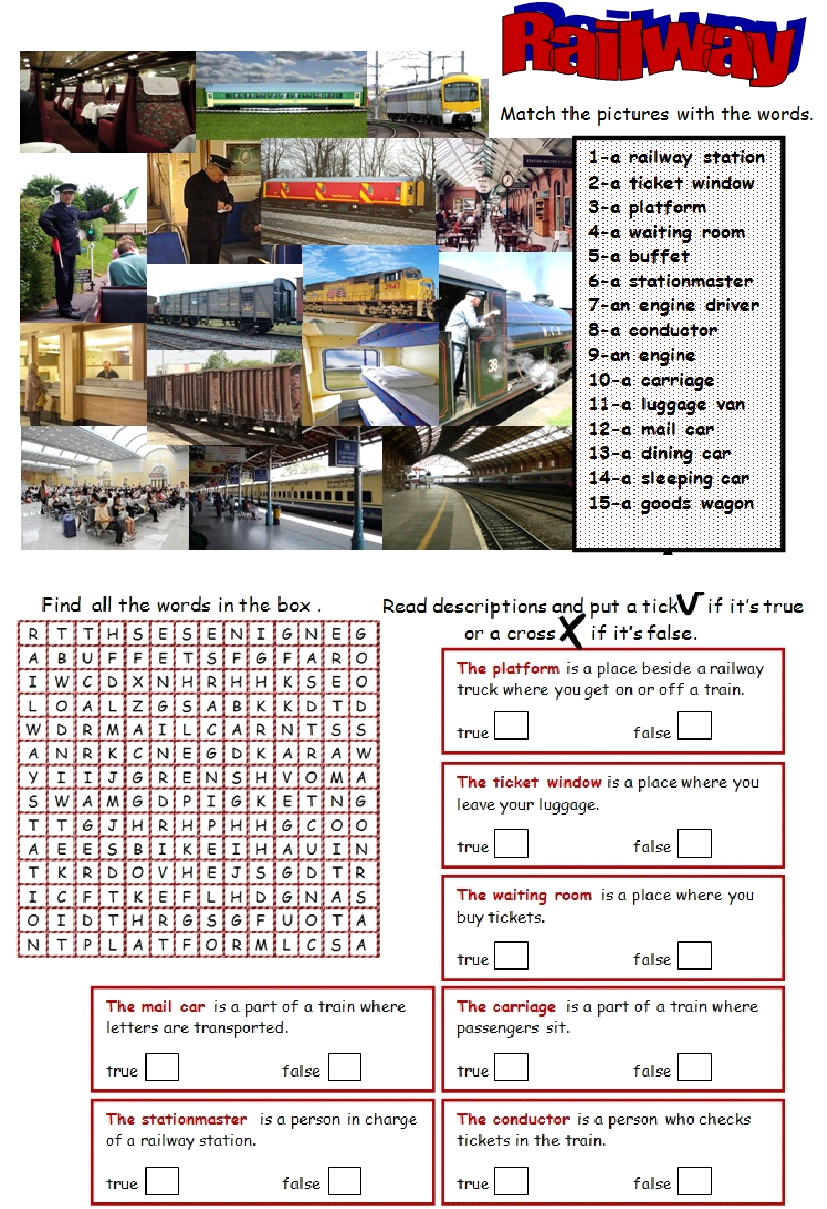
Read the text and do the tasks
Ukrainian Railways
Ukrainian Railways play a very important part in the national economy of the country because the economic development of a country depends on a wide network of transportation systems.
The railway network of our country is over 23,000 km long and some 41 per cent of it is operated by electric traction.
There are 6 railways in our country: L’vivska railway, South-West railway, Odeska railway, South railway, Donetska railway, Prydnaprovska railway. The overall fleet of freight cars numbering more than 23,000 units includes the big-loaded four and six-axle box cars, hopper cars, tank cars, refrigerator cars,and special-type cars. Passengers rolling stock consists of some 9000 coaches and almost all long-distance passenger trains are made up of comfortable carriages. All the car stock has been fully equipped with automatic coupler and automatic brakes.
The rolling stock of Ukrainian Railways includes over 1800 electric locomotives and some 3000 diesel locomotives. The whole number of stations is 1,833 including 51 sorting yards, 430 depos. About 5000 people is the staff of the railways.
Today Ukrainian Railways have been included into the European Railway Network.
Match the vocabulary with the correct definition and write a – d next to the 1 – 4.
1…….. platform a. A small piece of paper to allow you to use a train or bus.
2…….. ticket b. The place in a train station where people get on and get off trains 3…….. single (ticket) c. A ticket to travel to a place, but not to travel back. 4…….. return (ticket) d. A ticket to travel to a place and back again.
II. Find the missing phrases.
…. play a very important … in the … of the country.
The economic … of a country depends … of transportation systems.
The railway network of our country is over … .
… of it is operated by electric traction.
Passengers rolling stock consists of … .
The … of Ukrainian Railways includes over … and some 3000 diesel locomotives.
About … is the staff of the railways.
III. Answer the questions.
What part do railways play in the national economy of our country and why?
How long is the railway network of our country?
Is it operated by electric traction?
How many railways are there in our country?
What does the overall fleet of freight cars include?
What are almost all long-distance passenger trains made up?
How has all the car stock been equipped with?
What does the rolling stock of Ukrainian Railways include?
How many station are there?
Have Ukrainian Railways been included into the European Railway Network?
Сприймання інформації (ситуативних діалогів) на слух.
Listen to five different conversations at a train station and do the exercises to improve your listening skills.
Джерело: https://learnenglishteens.britishcouncil.org/skills/listening/a2-listening/trains-travel
Do this exercise while you listen. Complete the gaps with the correct place from the box.
Oxford—Manchester- London -Cambridge -Exeter
Listening A The speaker wants to go to _______________
Listening B The speaker wants to go to _______________
Listening C The speaker wants to go to _______________
Listening D The train is going to _______________
Listening E The passengers want to go to _______________
Виконання післятекстових завдань.
Check your understanding: question and answer
Do this exercise while you listen? Write the correct answer to these questions.
1. Which platform does the 10.15 train to Cambridge leave from? ___________
2. How much is a single ticket to Manchester? _______________
3. Which platform does the 12.30 train to Manchester leave from? ____________
4. What time does the train arrive at Exeter? _______________
5. What time is the train back to London? _______________
6. Which platform does the train back to London leave from? ___________
У наш час європейської інтеграції знання іноземних мов стає обов’язковим. Розвиток міжнародних зв’язків у галузі науки, техніки, культури вимагає від сучасної освіченої людини володіння хоча б однією іноземною мовою. Від рівня набутих знань часто залежить можливість швидко знайти чи своєчасно зрозуміти необхідну інформацію, якісно опрацювати її та отримати певний результат.
Проблема вивчення іноземних мов сьогодні дуже актуальна. Потреба, що зростає у спілкуванні та співпраці між країнами та народами з різними мовами та культурними традиціями ставить перед вітчизняною професійно – технічною освітою завдання: забезпечити не лише фахову підготовку провідника, але й підготувати спеціаліста зі знанням іноземних мов, в першу чергу англійської, як мови міжнародного спілкування.
Навчальний посібник складається з трьох частин. Перша частина є словником найуживаніших залізничних термінів і виразів, а також містить назви вагонного обладнання. У другій - згруповані слова, мовні звороти, фрази, питання, що вживаються у розмові при спілкуванні з іноземцями на залізниці. Третя частина дає змогу працювати з діалогами і текстами: містить завдання з читання та аудіювання.
Даний посібник набуває особливої актуальності в період поглибленої співпраці з європейськими залізницями. В умовах пожвавлення потоку пасажирів провіднику необхідно мати мінімальний об’єм навичок спілкування з іноземними пасажирами. Вважаю, що даний посібник стане корисним у розв'язанні даної проблеми.
Список використаних джерел:
Українсько – англійський розмовник. 3 – тє видання. Арій. Київ 2010
Англійська мова. Навчальний посібник. ДІІТ. 2006
Новий англо – український політехнічний словник. Арій. Київ 2008
English foe Technical Students. David Bonamy. 1989
https://pinterest.com/
https://www.liveworksheets.com/worksheets
https://learnenglishteens.britishcouncil.org/skills/listening/a2-listening/trains-travel
Коментарі
Дописати коментар